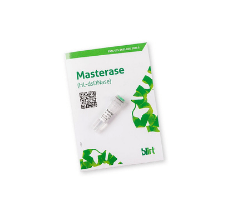
MASTERase (HL-dsDNAse), 500 U
- Brand: Blirt
- Catalog No.: EN31-005
- Quantity/Unit: 500 U /bottle
MASTERase (HL-dsDNAse), 500 U supplied by BLIRT is a recombinant endonuclease that is derived from a cold water eukaryotic organism, expressed in Pichia pastoris and has a molecular weight of 43.3 kDa. It is a heat-labile enzyme and possess high specific activity towards double-stranded DNA leaving single-stranded DNA or RNA undamaged in standard conditions. Masterase gets inactivated by heat treatment in moderate temperatures easily. It is employed in such experiments where the presence of dsDNA influences the result of the experiment in thermo-sensitive applications and it is extremely useful for rapid and safe purification of RNA or proteins samples from contaminating DNA. The enzyme hydrolyzes phosphodiester linkages yielding oligonucleotides with a 5-phosphate and a 3-hydroxyl group.
Applications include:
dsDNA digestion (plasmid DNA, genomic DNA, etc.).
RNA and protein samples rapid purification.
PCR, qPCR Master Mixes, or other diagnostic reagents decontamination.
Degradation of DNA template in transcription reactions.
Product Specifications:
Product name - MASTERase (HL-dsDNAse), 500 U
Catalog No - EN31-005
Brand: BLIRT
Pack size: 500 U
Product Features:
Highly active in a broad temperature range (10 47C).
Low-temperature activity to protect RNA or proteins.
Highly active in typical buffer formulations and broad pH range (optimum at 7.0 8.0).
Requires at least 2 mM Mg2+ ions for optimal activity.
Irreversible inactivation at low temperature (15 min at 52C, 1 mM DTT) to secure biological products integrity.
The activity towards dsDNA is at least 1000 times higher than towards ssDNA
Unit definition: One unit (U) is defined as the amount of enzyme that causes an increase in absorbance at 260 nm of 1.0 in 30 minutes at 37C in 50 mM Tris-HCl buffer, pH 8.0 (25C) supplemented with 5 mM MgCl2, 0.1 mg/ml BSA and 0.5 mg/ml herring sperm DNA as a substrate.


